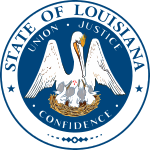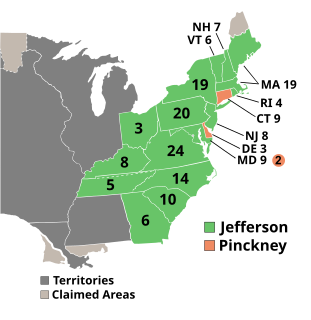
The 1804 United States presidential election was the fifth quadrennial presidential election, held from Friday, November 2, to Wednesday, December 5, 1804. Incumbent Democratic-Republican President Thomas Jefferson defeated Federalist Charles Cotesworth Pinckney of South Carolina. It was the first presidential election conducted following the ratification of the Twelfth Amendment to the United States Constitution, which reformed procedures for electing presidents and vice presidents.
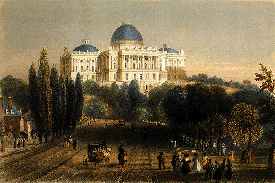
The 16th United States Congress was a meeting of the legislative branch of the United States federal government, consisting of the United States Senate and the United States House of Representatives. It met in Washington, D.C. from March 4, 1819, to March 4, 1821, during the third and fourth years of James Monroe's presidency. The apportionment of seats in the House of Representatives was based on the Third Census of the United States in 1810. Both chambers had a Democratic-Republican majority.

Joseph Marshall Walker was a Louisiana soldier and politician and the 13th Governor of Louisiana, from 1850-1853. He is best known for being the first Governor inaugurated in the new state capital building in Baton Rouge.
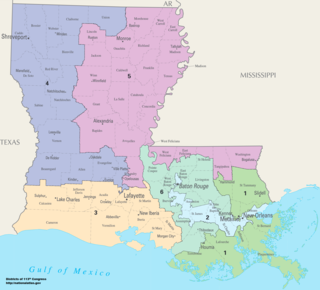
These are tables of congressional delegations from Louisiana to the United States House of Representatives and the United States Senate.

James Dunwoody Brownson De Bow was an American publisher and statistician, best known for his influential magazine De Bow's Review, who also served as superindendant of the U.S. Census from 1853 to 1855. He always spelled "De Bow" as two words.
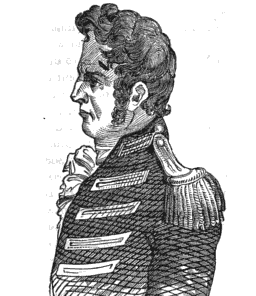
Eleazer Wheelock Ripley was an American soldier and politician. He fought in the War of 1812, eventually rising to the rank of brigadier general, and later served as a U.S. Representative from Louisiana, from 1835 until 1839.
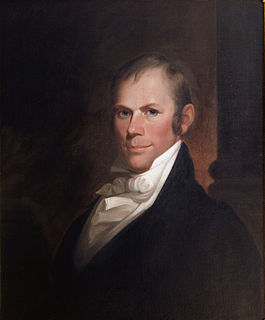
Elections to the United States House of Representatives for the 18th Congress were held at various dates in different states between July 1822 and August 1823 during President James Monroe's second term.

Elections to the United States House of Representatives for the 17th Congress were held at various dates in different states between July 1820 and August 1821 as President James Monroe won reelection unopposed.

Elections to the United States House of Representatives for the 16th Congress were held at various dates in different states between April 1818 and August 1819 during President James Monroe's first term. Also, newly admitted Alabama elected its first representatives in September 1819.
Effingham Lawrence was an American politician known for serving for the shortest term in congressional history, serving for just one day in the U.S. House of Representatives.
Louis St. Martin was an American politician from Louisiana.
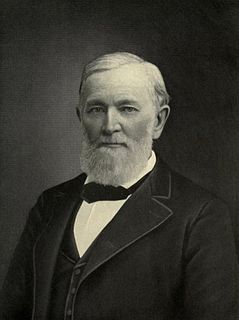
Edward James Gay was a financier and member of United States Congress. He was born at Liberty, Bedford County, Virginia, in the United States. Gay and his wife Lavinia Hynes were the grandparents of U.S. Senator Edward James Gay.

The Missouri Compromise was United States federal legislation that stopped northern attempts to forever prohibit slavery's expansion by admitting Missouri as a slave state in exchange for legislation which prohibited slavery north of the 36°30′ parallel except for Missouri. The 16th United States Congress passed the legislation on March 3, 1820, and President James Monroe signed it on March 6, 1820.

Pierre Augustin Charles Bourguignon Derbigny was the sixth Governor of Louisiana. Born in 1769, at Laon, France, the eldest son of Augustin Bourguignon d'Herbigny who was President of the Directoire de l'Aisne and Mayor of Laon, and Louise Angélique Blondela.
Rice Garland was a United States Representative from Louisiana.

Thomas Bolling Robertson was an Attorney General of the Orleans Territory, Secretary of the Louisiana Territory, a United States Representative from Louisiana, the 3rd Governor of Louisiana, Attorney General of Louisiana and a United States District Judge of the United States District Court for the Eastern District of Louisiana and the United States District Court for the Western District of Louisiana.
Events from the year 1822 in the United States.

Louisiana gained two seats in reapportionment following the 1820 United States Census. Louisiana elected its members July 1–3, 1822.
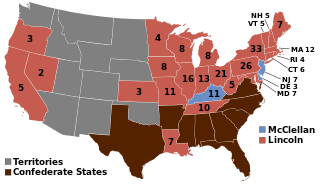
The 1864 United States elections were held on November 8, 1864. National Union President Abraham Lincoln was elected to a second term, while the Republicans added to their majorities in Congress. The elections were held during the American Civil War. Lincoln would be assassinated shortly into his second term.

The 1820 United States presidential election in Louisiana took place between November 1 to December 6, 1820, as part of the 1820 United States presidential election. The state legislature chose three representatives, or electors to the Electoral College, who voted for President and Vice President.
